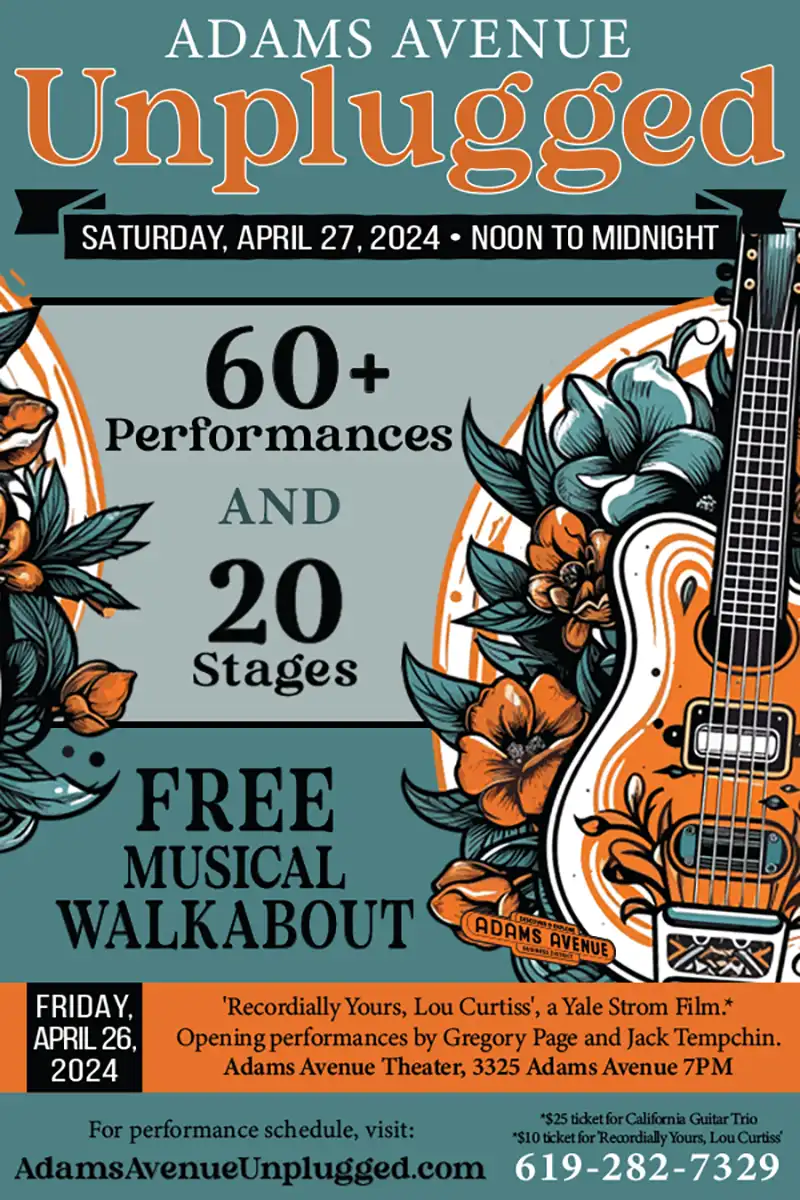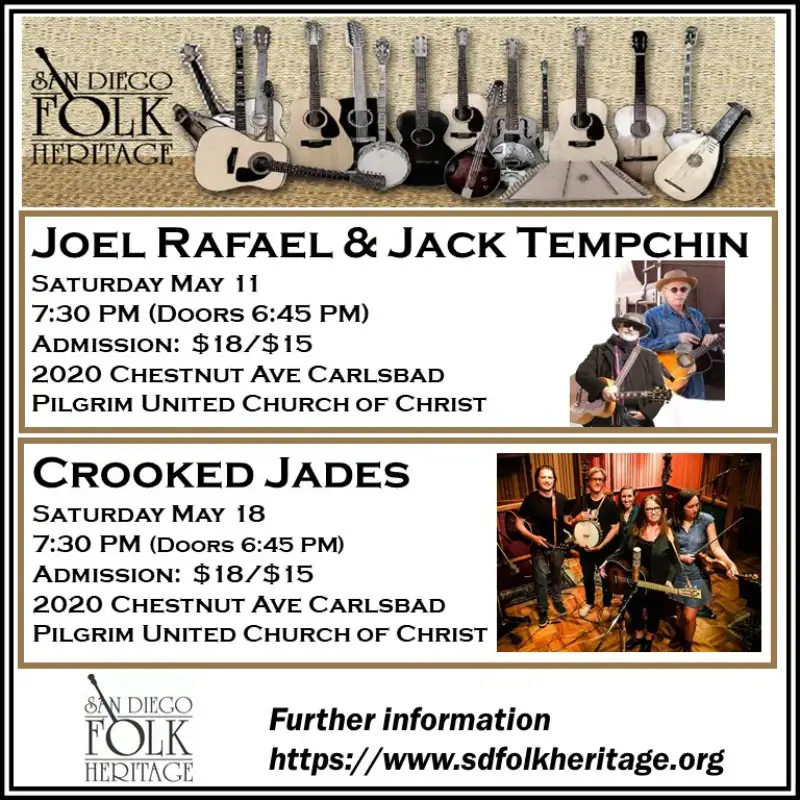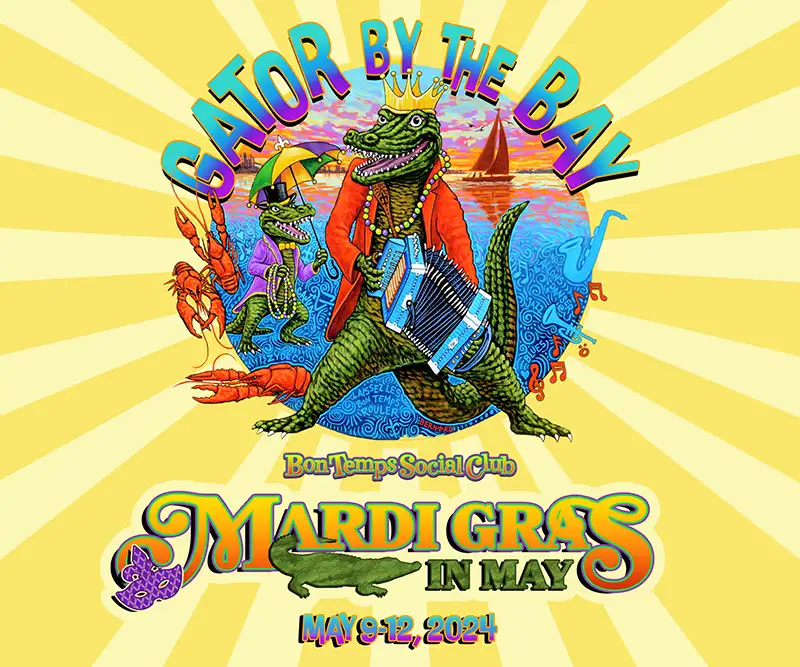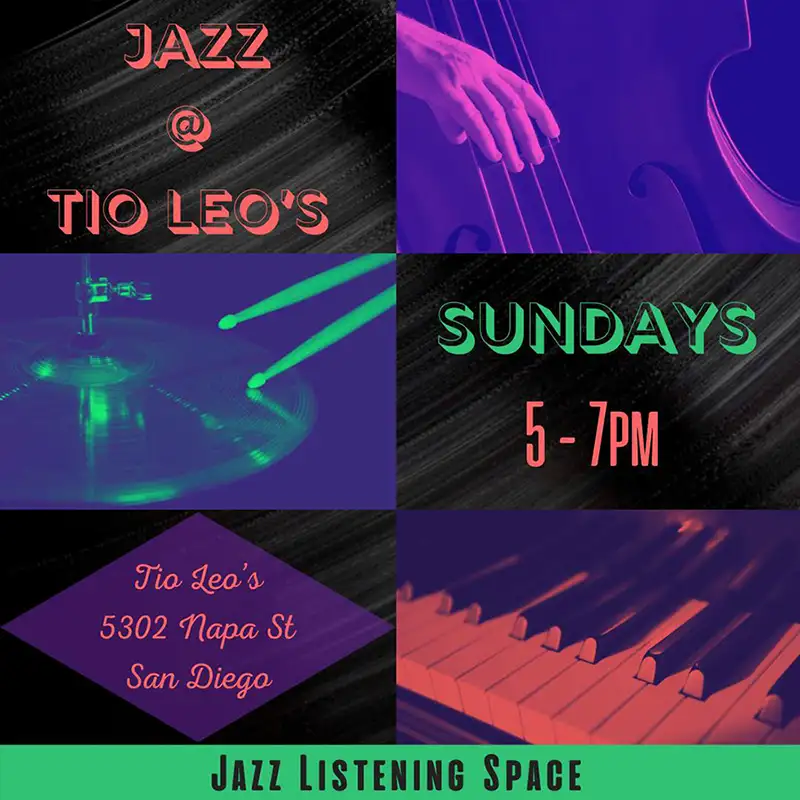Cover Story
JAMIE SHADOWLIGHT: In Search of Intelligent Life
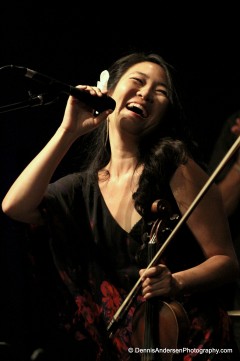
Jamie Shadowlight. Photo by Dennis Andersen.
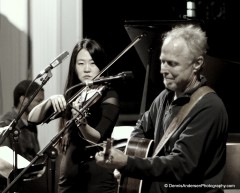
Shadowlight with Chuck Perrin. Photo by Dennis Andersen.

Shadowlight tames the dragon. Photo by Sean Selfridge.
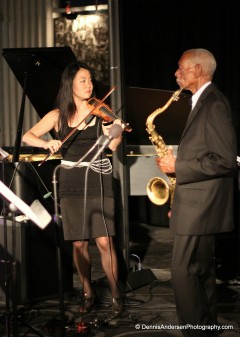
Shadowlight and Daniel Jackson at Dizzy’s. Photo by Sean Selfridge.
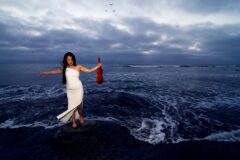
Shadowlight at Sunset Cliffs. Photo by Michael Klayman.
Look at the numbers, that’s all I ask
Who’s at the head of every class?
Do you really think they’re smarter than you are?
They just work their asses off
Their parents make them do it!
— “Korean Parents” by Randy Newman
Jamie Shadowlight is one sly, perceptive creature, seductively graceful and talented beyond the ken of the usual article. With a glint of mischief and as a means of introduction, she wishes to make two things sarcastically clear: “I just want to say up front that I am not in any relation to the leadership of North Korea… and there’s one other thing you have to know about me. I don’t have cable — but I do watch ‘Star Trek.’”
Some stereotypes, no matter how politically incorrect (or self-effacing), exist in the world for a reason. But with this pablum of propaganda that passes for news and entertainment in our current cultural climate, does anyone really need cable television anyway? Certainly anyone with half a brain already knows that there are far more substantive forms of entertainment going down in San Diego and if there is anyone worth following in our currently exceptional music scene of the moment it is virtuoso violinist Jamie Shadowlight.
Over the course of the last decade Shadowlight has made a reputation as one of the most talented and eclectic musicians to call San Diego home. A self-described “independent freelancer,” she makes her living performing and teaching music. When she’s not on stage or in the classroom she spends the remainder of her professional time building websites and refining her skills as a graphic designer, where her flair for the visual rival the sparks that fly from her electric violin.
Korean parents for sale
You say you’re not all that you want to be
You say you got a bad environment
Your work at school’s not going well.
Korean parents for sale
You say you need a little discipline
Someone to whip you into shape
They’ll be strict but they’ll be fair.
Shadowlight is (South) Korean by birth and spent the first two years of her life in Seoul being cared for by her grandparents after her mother and father immigrated to Chicago, Illinois. After joining her parents in the windy city she soon had a baby brother to keep her company and by the age of five was indoctrinated into the world of classical music by her mother, a gosu (drummer) in the Korean Pansori tradition. “I started playing the violin when I was five, around the time my brother was born and I played piano when I was eight.
“My earliest conscious memory is of the cold — I guess that’s part of being in Chicago — and the lights. But musically I don’t have very many memories except the hours of listening to my mother. My mom was a percussion player and a dancer. In Korea a lot of the drums are held by the women. It’s a beautiful art and my mom did that before she met my dad and she had a great discipline. She was my discipline when I was a child. A kid may wake up singing naturally but no kid naturally plays the violin [laughs]. It is an instrument that takes many years to learn. So my mom was a discipline for me, she made me work really hard.
“My mom did that, she gave me my start in music. And my dad loves opera, so we grew up with a lot of classical music and opera — not much other stuff.”
Oh, learn to play the violin
Oh, to turn your homework in right on time
What a load off your back that will be…
Within a year of picking up the violin Shadowlight’s family moved to Torrance, California, where she became conversant in sight-reading and displayed an exceptional aptitude for the violin, earning many honors throughout her time at school (including the Grand Prize for the LA/Korean Times Concerto Competition and the Gold Medal for her trio in the Bach Festival). “I didn’t start out wanting to be a musician,” she says. “I mean, I played music all my life, I’ve been classically trained — Bach, and all that stuff.
“When I was a child, it was very structured and there was so much pressure. But it had no self-expression, no side of the artistry to it. It was stressful and I didn’t enjoy it, it didn’t show me any part of my soul. When I work with kids today a lot of it is preserving the love of music, sharing the love of music, the expression of it and realizing this is a tool in your life to help express balance — it’s a joy. When I was a kid it was a competition tool. It was a thing to gain achievement, to get into colleges, which I never went to. At 18 I became a street musician. It just happened. I follow the path in front of me and when those forks in the road come I try to make the hard decisions… and it’s led me here. It’s led me to many nights of beautiful music, effortlessly. I mean, not effortless because of course, you have to do a lot of work to make it happen, but it’s kind of like… when things are right, they’re right. And as difficult as it is to bring people together, whenever we have done it, it has been natural.”
Within a month of graduation from high school, Shadowlight busted loose from a lifetime of familial and academic structure for a season of bohemian adventure. “I was a Dead Head, because the guys that I was living with at the time were Dead Heads. It was based out of Oregon, San Francisco. It wasn’t for a long period of time. It was my Jack Kerouac On the Road experience. It’s what every child has to do to burst out of the confines of perceived education and the system and all that stuff.” A film called Tie-Died, a documentary about the sub-culture of Grateful Dead fans, managed to capture Shadowlight during this period, improvising in a Portland parking lot while a bearded man on screen explains how the elder Dead fans are imploring “young people not to abuse their body or their soul and to try to do good and get along with people. As you can see we seem to do it pretty well.”
“I was playing on the ground in Oregon,” says Shadowlight, “with this singer that I had met. It was just a totally different experience — the joy, the sharing — it was just so mystical. I actually only went into one Dead show because we could listen from the parking lot. We were so broke back then and the Dead were commercially expensive but it was still that experience of meeting those kinds of people, being under the stars, watching the moonrise, and playing outdoors with music being a part of life. You wake up and there was no money involved, it was just to play. That started me on the path of another kind of music. And then when I came to San Diego I met a lot of jazz musicians. I don’t consider myself a jazz musician; I’m a contemporary violinist. But I play with jazz musicians and I improvise. I’m very reluctant about categories because once you define yourself, you limit yourself and you don’t get a chance to really fulfill your destiny. Because who knows what you may become?
“You just try to serve the moment, serve what’s on the plate next and give it all you’ve got. Sometimes you fall on your face [laughs] and sometimes you fly. But you get up and you do it again or you raise your arms up in victory and do it again….”
If Shadowlight has a home away from home it would appear to be Dizzy’s, the premier listening room in San Diego for jazz and Latin-oriented music. Over the past few years Shadowlight has produced several unique programs, including an adaptation of West Side Story as a harmonic love story between the violin and trumpet (featuring the horn of Gilbert Castellanos) and Jazz Meets Stars Wars (where Shadowlight plays Princess Leia to Castellanos’ Luke Skywalker). Other programs with an electric jazz fusion bent have featured the music of Jimi Hendrix, Led Zeppelin, Santana, and Jeff Beck (many of the arrangements that Shadowlight plays borrow heavily from the vibe of Jeff Beck’s Blow by Blow period).
“I’ve been playing with a band called Jazzmikan Trio+. It’s Mikan Zlatkovich, an amazing jazz pianist. He’s like Oscar Peterson, Ahmad Jimal; he’s just really, really good. I’ve been in his project for about a year now. And I’ve been in many orchestras; the most recent one was a very good project called Marshall Hawkins Seahawk Mojo Orchestra. We played at the Joan Kroc Theater; it’s a jazz orchestra. And it has amazing people floating through it — Evan Christopher, Harold Mason, Richie Cole, Daniel Jackson, Sal Marquez, Gilbert Castellanos, and this incredible orchestra filled with amazing jazz musicians from all over the United States. I was concertmaster for that show and I was also soloist, which was a huge honor for me.”
In addition to performing live, Shadowlight has also spent a fair amount of time in the recording studio. She released her first CD Music from a Love Shared in 2004 and is in the process of recording a new CD titled Songs of the Seeker. She has also recorded with scores of other locals including Joe Marillo, Paul Kamanski, Chris Carpenter, Chuck Perrin, Mahaba, and Larry Mitchell.
Shadowlight: “From the infinite amount of choices that can fulfill every moment, some of them are hard to make. A lot of times it’s what’s in front of you — what’s naturally put in front of you is what we take. I think, overall, what it comes down to is just having a beautiful life. Doing the little things, you know all those things are just going to be dust in the wind — gone and forgotten. You just try and contribute something. There’s so much in the mind to achieve and so many ideas to bring through and every idea takes a certain amount of time to do right. The amount of work that it takes to fulfill a concept is enormous. Even a single song, you know? As long as you fill your moments with something, you just make your choices and those choices mean that other choices don’t get made, don’t get attention. And they’re hard choices to make. In the end I just can’t hold on to anything. I hope to leave behind a living legacy at the end of my days [even though] to me that whole concept is futile — not in a bleak way but in a cosmic way. As you get old enough you start to understand the impermanence of life. As a child, we don’t come out aware and part of everything. We come out very within our own heads. And part of the education, part of growing and becoming a human being, as an aware human being is stepping outside of your own head. The arts help do that because you’re stepping into songs and poetry and music and films that help you get outside your own head. And the more you get outside your own head the more the view from above is… it’s just a more real picture. As artists we hope to contribute to that, you know. By sharing our experiences if somebody steps into your experience it steps them outside of their own head. So, the whole concept of impermanence and the awareness of that feeds your choices.”
The Search for Intelligent Life on This Planet
Shadowlight: “One of my dreams, it doesn’t have to do with music, but I had this idea about a year ago to start an exploration called “The Search for Intelligent Life on This Planet.” It would be like a YouTube hand-held camera thing, and we would look at something, like going into the supermarket and you look at all the frozen foods with everything just left open, it’s freezing in there and all that energy and is this intelligent? And you look at systems and you look at anything from power, you look at the effects of it on the environment, like packaging. You look at it and you give some information on how many tons get thrown away — what’s the use of this? And then you ask yourself ‘is this intelligent?’ And if the answer’s “no” then you go searching for an intelligent answer and you scour the world and it’s called “The Search for Intelligent Life on This Planet.” And I really, really want to do something like that and I don’t have the budget right now. I have to make a living. But I’m hoping to start that in the next year or so. Even locally, and it would be an inclusive thing where all around the world people can also start asking these questions and doing the search and uploading videos, you know?
“It’s a multi-media project. For example, when you look up the word ‘intelligence’ it’s the ability to grow and change, to take in information. That’s the main definition — that you have the common ability to look at things and grow, change. There’s no script. It’s such a big concept that I don’t know where to start. But I’m figuring to start with what’s in front of you — you know, look at this packaging, look at the amount of oil spent on all of this stuff and hopefully it will just take me into some dialog, some solutions, and give me hope.
“I believe a lot of people do things and they don’t understand the impact. And they do things ’cause it’s the easiest and it’s what the people in charge put in front of you. Like what you buy at the supermarket. It’s just coming into light what we’ve been eating. And the marketing and the packaging and all the lies about what you’re putting into your body and the chemicals. But when you go to the grocery store you have to have an alternate choice; you can’t make that choice if it’s not in front of you to buy. How do you reduce packaging and waste when everything is packaged that way? It has to come from the people who are creating [it that way] and hopefully we can just bring to light [some solutions] — I hope we can uncover some intelligence — that’s all. And it’s boundless, no ceiling to what kind of intelligence it has to be.
“It’s a fairly new idea, and I’m doing so much other stuff. But it feels like something that my heart wants to initiate. I might not even be the one, I may just start it and step back and hopefully people will contribute. I know it’s a huge quest, but every time I come across something that’s so irrational I always think of this, you know [laughs]. It’s just a concept right now.
“But I do hope to create more music and I hope to keep contributing to this community; one of the great contributions is in the graphic world. I’ve built websites for Charles McPherson, Peter Sprague, Daniel Jackson, and hopefully I will help them with their music by giving them visual aid to help people know that they’re playing. And I hope [that] musically I’ve contributed something of beauty in these past years you know, creating beautiful moments.”
The greatest generation
Your parents aren’t the greatest generation
So sick of hearing about the greatest generation
That generation could be you
So let’s see what you can do
Korean parents and you.
Shadowlight: “Hopefully, if you’re doing things right, you keep growing and keep understanding and keep getting better at what you love, getting better at your craft. Becoming more true to your heart and your soul. Getting rid of all the excess, of conditioning and all that stuff that we’ve all gone through living here. Some years there’s just a marked growth when you look back at the rings of your life, and often those years of extreme spiritual and personal growth are accompanied by hardship. It is just part of the gift. And if you can walk away from it and gain that perspective you get that gift.
“Popularity and success — there are connotations of those words and they’re different for everybody. One person’s success is another person’s failure.
“I’m so surprised whenever anyone finds you as you just quietly keep doing what you do. All the great moments and achievements are so quiet and personal: one-on-one, between five people, between ten people, between a teacher and a student. My idea of success is not being popular — success is something that comes from walking a true path. From making those decisions, those quiet decisions and giving every moment. My personal goal is to contribute something beautiful to the world.
“The music is just one way to express that. We have an instrument, we have a craft that helps us as artists to share something of that discovery, but there are many ways to do it. It can be in a hug or a smile, a conversation. I believe we’re here to help pull each other into consciousness. That to me has value: people who can help elevate consciousness and bring me into the moment and help me be more aware. To me, that’s the Holy Grail. To be more and more aware, whatever that is, of the possibilities. It’s like what the world is looking at right now with the invention of the telescope. Man, these telescopes out in space, it’s so symbolic of our consciousness here as human beings. And that’s the same with the soul and the growth of the soul and exploration of the soul, it’s like the universe… poof!… it’s just endless and I’m kind of a seeker of that in my life.
“There is no expiration date on dreams.”
Upcoming shows featuring the electric violin of Jamie Shadowlight include “Music from the Movies” on Saturday, October 12 @ 8pm with the Jazzmikan Sextet at Dizzy’s. Also, on Friday, November 29 @ 8pm Shadowlight appears at 98 Bottles with a program titled “The Soulful Side of the Violin,” featuring the compositions of Stevie Wonder, George Benson, Ray Charles, and Grover Washington (with gospel singers from the MLK Choir Arnessa Ricketts and Carmelia Toot Bell, keyboardist Mikan Zlatkovich and percussionist Monette Marino).
The continuation of a conversation with Jamie Shadowlight:
[Jon Kanis]: So, how does music relate to your consciousness in terms of maintaining balance or expressing that infinite truth?
[Jamie Shadowlight]: Well, it brings me into the moment and it gives me a medium where I can share a vibration — a tone and a vibration. Sometimes you’re rocking out and it’s just to play. But the quest is to get that tone. The note is just a ripple on the top of the lake. What’s underneath that tone is a lifetime of experience and a meaning that you can only get by living the life and making the choices that you do.
I like playing with a lot of different people because it helps bring me into the moment and imagine new things. It helps me evolve. By listening to what you’re playing it makes me more than I am.
Do you mean by a method of harmony or something that’s contrapuntal or even atonal to…or in relationship to the other?
Just by becoming part of another music, you know? Whether it’s a Bob Dylan song or an original song, just by the act of playing together. And there’s so much joy in music, there’s so much of a community and happiness and awareness and sadness. It’s one of the great art forms, I just love it so much. I love playing.
Why else would you do it? It’s not a convenient thing to be an artist.
No.
The hardships involved with setting up gigs, lugging your gear around. Just trying to get four other artists in the room together, all pulling the boat in the same direction is a miracle.
It is. Any act of harmony is a miracle…and yet, gatherings are so beautiful.
Well, community is essential and music is everything to me. I really like the idea in Hinduism that all of vibratory creation is created out of the sound of “Aum” (or Om) in that cosmology. There’s bringing creation into being (A), there’s that state of becoming (U) and then there’s the dissolution (M) — all under the A-U-M. And I think that’s what music is in a sense, it’s this physics principle. Like the Heisenberg Principle, which purports that on the sub-atomic level what I choose to project upon you, that I literally create you in my field of perception. And you, in your field of perception literally create me in yours. And how we choose to project upon one another literally changes the molecular structure of one another.
I believe that, that’s why you try to put out that positive vibration and love. The world needs it. There is a saying: “It’s not the medium, it’s the expression.” It can come through in a poem, a story. If you have something to say, an artist can express it through music — a song, a solo, it can be anything. It can be a touch…
I still feel like such an amateur in music. Not amateur, but there’s so much study, there’s so much to learn and understanding chord structures and harmonies and so many songs to learn and I’m lucky if I remember my phone number [laughs] that’s why I have this [picks up cell phone].
You know, I’m spiritual, but I don’t have any religion.
I’m a cinephile — I love the cinema. But I think that the only reason to watch a film is so it can inform you in some positive fashion rather than offering you an escape from your life; because if you’re living your life in a mindful manner you don’t need to escape. I understand that people make a lot of choices to do what they think they need to do in order to survive and then the tradeoff of working on something that they can’t stand for 8 to 10 hours is to “reward” themselves with an “escape.”
Have you seen The Weeping Camel?
No.
[nods] You would love it, it’s a Tibetan film. It is one of the most beautiful stories and it is about music, the healing power of music. It is about this tribe in Tibet and they have these camels, the royal family of the princess, and the camel has a baby and one of the babies is traumatized, so she won’t feed this baby. They go on this quest, and they’re in the middle of nowhere in Mongolia and they go into the city and bring back a healer. It’s just this beautiful trek through the heartland and they come back with the healer and the healer plays this music and the camel cries and ends up feeding the baby. The whole journey is so beautiful.
Well, you understand the nature of chi and meridians and that sort of thing in acupuncture?
Yeah, my uncle does that.
So, animals, just like human beings, have their own pool of consciousness that they draw from. Anything that a human being has done I believe that we are all heir to. We can all become Buddha or Christ or Hitler — it’s just a matter of choosing from free will. Whatever you wish to manifest in your localized ego in this little slice of infinity. A camel has consciousness just like any other sentient being and who’s to say it doesn’t have it’s own blocks and that there are ways of “magically” unblocking the chi so that those walls are broken down somehow, even by a violin being played.
It was some kind of Mongolian string instrument, and it just played this song and it was so beautiful. It’s such a simple, quiet movie. And visually striking — you would like it.
Have you heard a song by Randy Newman called “Korean Parents”?
No, but I believe it.
I’m going to play it for you before we say goodbye.
I’m going to learn it [laughs].
“Kids today got problems like their parents never had
Neighborhoods are dangerous the public schools are bad
At home there are distractions so irresistible
The hours fly by no work gets done
Some Jewish kids still trying some white kids trying too
But millions of real American kids don’t have a clue
Right here on the lot we got the answer
A product guaranteed to satisfy.
Korean parents for sale
You say you need a little discipline
Someone to whip you into shape
They’ll be strict but they’ll be fair…”
So your mom was a disciplinarian…are your folks still alive?
Yes, they’re still together.
Where are they?
Up in L.A. My dad was more, not musical, but he loves opera, so we grew up with a lot of classical music and opera — not much other stuff. There’s Korean folk music — Pansori, you know the Korean blues? Beautiful instruments, usually like drums and flute, it’s the ultimate blues. Because Korea was occupied and enslaved, but my parents didn’t grow up with a lot of hate.
Well, that brings up…to me studying the blues in America — it’s like racism, slavery, oppression — racism is an irritant and the pearl that comes out of it is the music. We wouldn’t have Bessie Smith and we wouldn’t have Charlie Parker if not for those imbalances in society, so that’s also a kind of irony because without those things to provide a shadow to the light, that’s where you get the chiaroscuro aspect of the music. Pansori, the blues of Korea, I’m going to have to do some research because I know nothing about that.
There was a good movie about it too, where they actually blinded the kid. It’s a very difficult craft and in this movie — it won a lot of film festival awards — and it’s probably true, this young girl was brought up to be a Pansori player and so they took her eyes to really make her dedicated — that’s some really, really heavy shit man [laughs]. But again, whenever the spirit, like in Chile, all those great songs that came out of Chile — Victor Jara during [Augusto] Pinochet — Bob Dylan, all these songs that came out when the spirit and freedom is oppressed, then expression becomes necessary.
I Know Why The Caged Bird Sings.
Yeah, oh I love that. I think the powers that be figured that out — what they do is they distract you — the trick to being a successful dictator or suppressor of action is to give ‘em just enough to be complacent. It’s only when things are really, really bad that people are moved. As long as people have enough.
America’s a beautiful example of that.
Yeah, George Carlin said it…[laughter]
…to have citizens who are educated just enough to keep the machines going and not enough to understand how badly they’re being screwed in the ass by a great big red, white and blue…
Yeah, well, we have that. I don’t wanna risk what I have now because of survival you know? It’s when it goes beyond that level. You would think that the world’s leaders would understand that.
We need to not be afraid of what is going to be taken away in the future, to see what’s really here. Like we said, it’s a balancing act every moment — being aware. I think we all have moments of clarity. Everyone in the world has moments of clarity. But, to maintain that is an ongoing process. Through all our human emotions and hormones and everything and all that. But it is just keeping that chi open and contributing.
Do you work for the NSA [National Security Agency]?
[laughs] I couldn’t be… in fact, if anything I am the antithesis of the NSA.
But you are recording…
I am indeed recording our conversation. I saw that post that you put up on Facebook, in regards to those t-shirts on Café Press that has the insignia for the NSA with the motto: “The only part of the government that actually listens.” I read that the government wanted to shut down the artists who were responsible for satirizing the NSA. Isn’t that ridiculous? To me the idea behind even making music at this stage of the game is to create a counterpoint to the negative density. I believe what Bill Hicks said to be true: that you don’t have to be a conspiracy theorist to understand that an elite ruling class controls the resources of the government, the media, the legal system — that all the control mechanisms of society are for the privilege of a select few. And because of this, those who are trapped in the literal Matrix of things who are providing the labor to produce capital for the benefit of a very elite few — that system is completely out of balance. Eventually it will come into balance — but it can’t be fast enough for me. I want it to happen now. I want all of these systems to go away, they are not serving the greater good of humanity whatsoever.
It’s such a beast to fight and it’s so hard to change that only the death of those people involved will bring it about. And perhaps they’ll never die ‘cause they’re like the nine-headed Hydra where they just pass it on and create another monster to administer that. That’s why a lot of us are choosing to unplug. I can’t say I’m off the grid because I’m on Facebook.
Do you think that ultimately some kind of paradigm shift can occur? When enough people shift and evolve in their consciousness?
Like what you said, it’s controlled by the few and enough people can raise their voices but those people have so much power and have already messed things up so much. I hope so.
Do you believe that it’s possible that a paradigm shift will occur in our lifetimes?
Hmm, in our lifetime? It’s like walking into a white room and somebody’s just spilled a whole lot of — they had a red paint party, you know? You could turn it pink…[laughs]…at best, you know? If you try to fix that, I don’t think it will happen in our lifetime, or the next. But hopefully the shift will start. It’s like those endangered animals in the ‘80s, there were numbers of whales and eagles were really going down and then people took action and banned a bunch of stuff and just last year you see the numbers going back up. And then you have the nuclear spill and all the whales are dying — blah, blah, blah — so I don’t know.
You seem like you’re pretty cosmically awake.
See, that’s where the hope is cause when you look back at the shift in our own consciousness you know you can hope, it gives you hope for growth and evolution for the masses. And they [the government] try to suppress it by making it all illegal and whatnot — and really putting the fear factor on it.
I like to think that every time you take a breath hopefully you’re putting out something that adds to the collective’s upliftment and unfolding rather than bring you down into density.
Beautifully put.
Luckily we are capturing it all for the NSA.
I do not work for the Korean government. [laughs] I’m telling you right now.
You are such a devilish mixture — you have this benevolent surface…but I’ve been getting glimpses of what’s additionally underneath that.
Oh yes, I have a wicked sense of humor. I love playing practical jokes and I like to laugh. But part of the fun of having a creative mind is being able to really play with people [laughs].
[laughs] That’s about as fitting a conclusion as any.
I think so — but in a fun way, not in a mean way. Except for that one time… [laughs] Just kidding! You know, in the music world we’re always laughing and that’s part of the joy of it, I think. That’s my story and I’m sticking to it.
All right, I’m going to thank you officially.
Okay. Over and out.
And this has been a total pleasure.
Nanu, nanu.
For more information, visit www.jamieshadowlight.com


